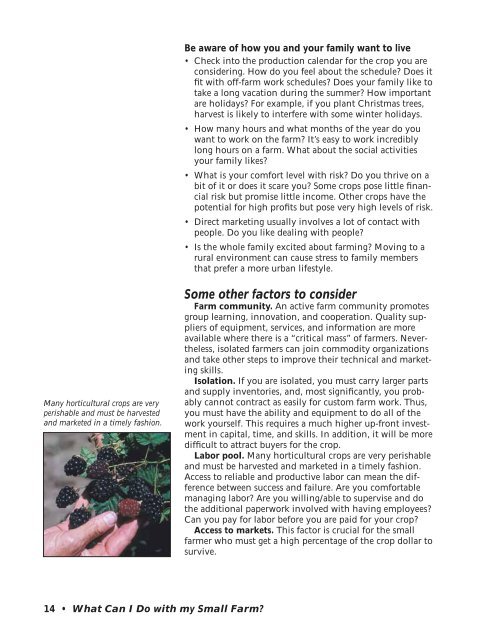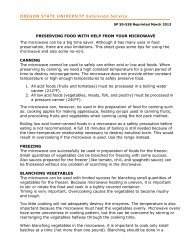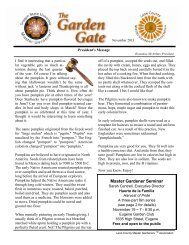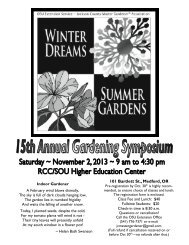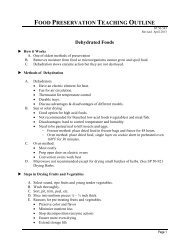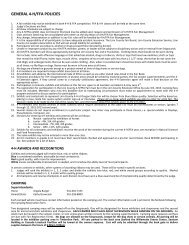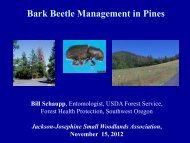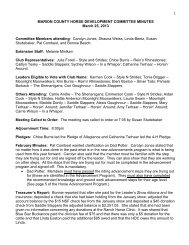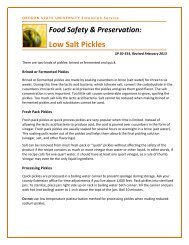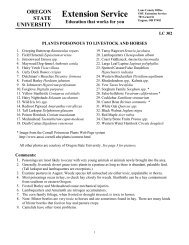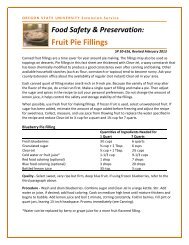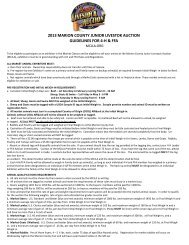What Can I Do With My Small Farm - Oregon State University ...
What Can I Do With My Small Farm - Oregon State University ...
What Can I Do With My Small Farm - Oregon State University ...
Create successful ePaper yourself
Turn your PDF publications into a flip-book with our unique Google optimized e-Paper software.
Many horticultural crops are very<br />
perishable and must be harvested<br />
and marketed in a timely fashion.<br />
14 <strong>What</strong> <strong>Can</strong> I <strong>Do</strong> with my <strong>Small</strong> <strong>Farm</strong>?<br />
Be aware of how you and your family want to live<br />
Check into the production calendar for the crop you are<br />
considering. How do you feel about the schedule? <strong>Do</strong>es it<br />
fi t with off-farm work schedules? <strong>Do</strong>es your family like to<br />
take a long vacation during the summer? How important<br />
are holidays? For example, if you plant Christmas trees,<br />
harvest is likely to interfere with some winter holidays.<br />
How many hours and what months of the year do you<br />
want to work on the farm? It’s easy to work incredibly<br />
long hours on a farm. <strong>What</strong> about the social activities<br />
your family likes?<br />
<strong>What</strong> is your comfort level with risk? <strong>Do</strong> you thrive on a<br />
bit of it or does it scare you? Some crops pose little fi nancial<br />
risk but promise little income. Other crops have the<br />
potential for high profi ts but pose very high levels of risk.<br />
Direct marketing usually involves a lot of contact with<br />
people. <strong>Do</strong> you like dealing with people?<br />
Is the whole family excited about farming? Moving to a<br />
rural environment can cause stress to family members<br />
that prefer a more urban lifestyle.<br />
Some other factors to consider<br />
<strong>Farm</strong> community. An active farm community promotes<br />
group learning, innovation, and cooperation. Quality suppliers<br />
of equipment, services, and information are more<br />
available where there is a “critical mass” of farmers. Nevertheless,<br />
isolated farmers can join commodity organizations<br />
and take other steps to improve their technical and marketing<br />
skills.<br />
Isolation. If you are isolated, you must carry larger parts<br />
and supply inventories, and, most signifi cantly, you probably<br />
cannot contract as easily for custom farm work. Thus,<br />
you must have the ability and equipment to do all of the<br />
work yourself. This requires a much higher up-front investment<br />
in capital, time, and skills. In addition, it will be more<br />
diffi cult to attract buyers for the crop.<br />
Labor pool. Many horticultural crops are very perishable<br />
and must be harvested and marketed in a timely fashion.<br />
Access to reliable and productive labor can mean the difference<br />
between success and failure. Are you comfortable<br />
managing labor? Are you willing/able to supervise and do<br />
the additional paperwork involved with having employees?<br />
<strong>Can</strong> you pay for labor before you are paid for your crop?<br />
Access to markets. This factor is crucial for the small<br />
farmer who must get a high percentage of the crop dollar to<br />
survive.


